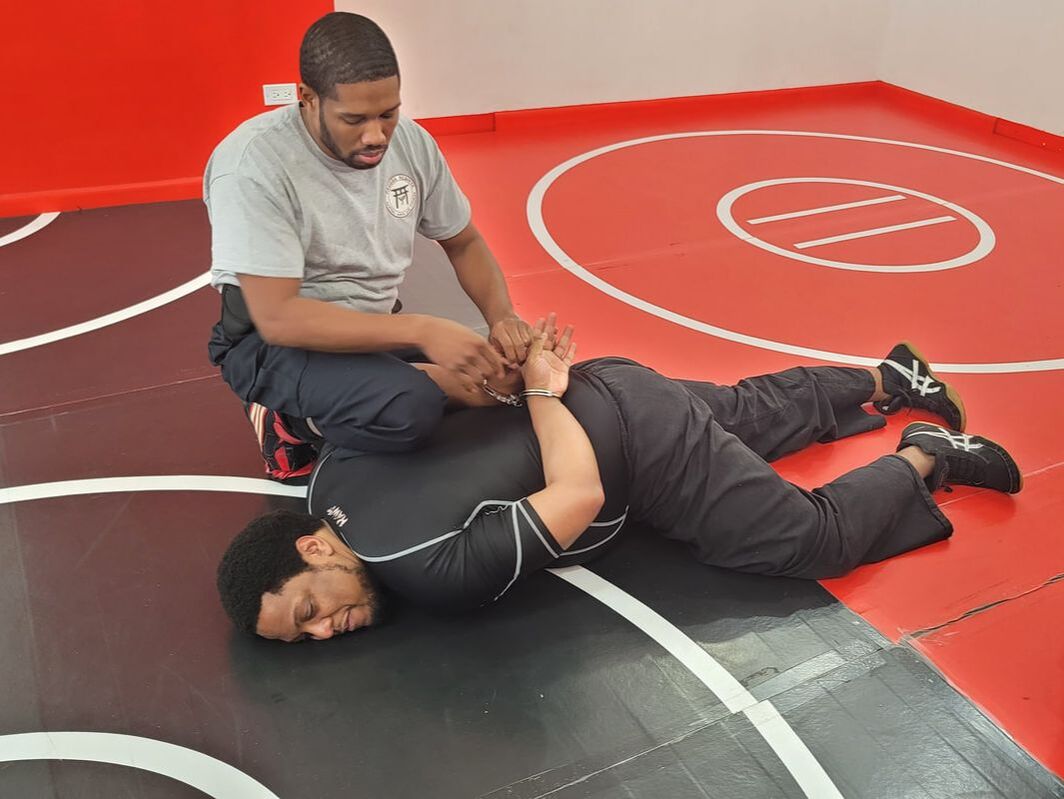LAW ENFORCEMENT COURSES
(Pagoda Rebirth Control Tactics)
These workshops are ideal for any law enforcement departments/agencies looking to provide an introductory or refresher training course for officers in the foundational elements needed to maximize officer safety and minimize excessive force incidents.
WHAT WILL PARTICIPANTS GAIN FROM THE TRAININGS?
The most critical elements for reducing excessive force incidents are developing skilled, confident, and empathetic officers through quality training in verbal de-escalation, psychological skills, and physical control tactics. The training courses below cover each of these elements in depth, including strategies for maintaining these skills long term!
WHO HAS DR. BUTLER DONE TRAININGS FOR?
University of Illinois Police Training Institute
East Dundee Police Department
SVCC Police Academy
Judson Campus Security
TRAININGS
Use of Force: From Initial Contact to Complete Control
Course Description
This ILETSB-approved course is the core control tactics system taught at the SVCC Police Academy. It provides participants with our complete use of force curriculum from the critical strategies for de-escalating conflict to the foundational control tactics for safely handling a confrontation. Examples of content in this course include: threat assessment training, video analysis of force encounters, scenario training for practicing verbal skills, punch protection, weapon retention, and control techniques leading to handcuffing.
Mental Performance Training: The Missing Element for the Modern Day Officer
Course Description
Mental skill development (a.k.a. psychological skills training) is one of the most critical yet underemphasized areas of an officer's training. In this NEMRT-approved course, participants will develop and implement psychological skills such as confidence, resilience, imagery, self-regulation and performance-stress management, into their training with emphasis in the use of force domain. With confidence at its core, developing these skills are critical to an officer's ability to successfully handle a force encounter with minimal issues. This 4-hour course is designed for all officers but especially command staff and shift supervisors on the key sources for building a culture of officers who are physically AND mentally prepared, along with its' link to reducing the number of excessive force encounters in policing.
Scenario Based Verbal De-Escalation Training
Course Description
In this course, officers will learn the critical strategies for de-escalating conflict and generating voluntary compliance in their interactions with the public. Officers will also learn the importance of empathy and how to use it to maintain the highest quality of public service during the most challenging times. This course will also include live training scenarios so officers can practice the verbal skills and address areas of improvement.
Control Tactics 101
Course Description
This 4-hour course will teach participants the foundational control tactics, both standing and on the ground, during a confrontation. Participants will analyze video footage of real encounters and learn a variety of techniques, and more importantly, principles that aid in knowledge retention. Examples of content in this course include: safely getting back your feet if you end up on the ground, punch protection and weapon retention from your back, and effective, non-violent subject control techniques leading to handcuffing.
Additional workshops related to non-lethal force, weapons defense, officer wellness, or psychological factors associated with use of force are available upon request.
(Pagoda Rebirth Control Tactics)
These workshops are ideal for any law enforcement departments/agencies looking to provide an introductory or refresher training course for officers in the foundational elements needed to maximize officer safety and minimize excessive force incidents.
WHAT WILL PARTICIPANTS GAIN FROM THE TRAININGS?
The most critical elements for reducing excessive force incidents are developing skilled, confident, and empathetic officers through quality training in verbal de-escalation, psychological skills, and physical control tactics. The training courses below cover each of these elements in depth, including strategies for maintaining these skills long term!
WHO HAS DR. BUTLER DONE TRAININGS FOR?
University of Illinois Police Training Institute
East Dundee Police Department
SVCC Police Academy
Judson Campus Security
TRAININGS
Use of Force: From Initial Contact to Complete Control
Course Description
This ILETSB-approved course is the core control tactics system taught at the SVCC Police Academy. It provides participants with our complete use of force curriculum from the critical strategies for de-escalating conflict to the foundational control tactics for safely handling a confrontation. Examples of content in this course include: threat assessment training, video analysis of force encounters, scenario training for practicing verbal skills, punch protection, weapon retention, and control techniques leading to handcuffing.
Mental Performance Training: The Missing Element for the Modern Day Officer
Course Description
Mental skill development (a.k.a. psychological skills training) is one of the most critical yet underemphasized areas of an officer's training. In this NEMRT-approved course, participants will develop and implement psychological skills such as confidence, resilience, imagery, self-regulation and performance-stress management, into their training with emphasis in the use of force domain. With confidence at its core, developing these skills are critical to an officer's ability to successfully handle a force encounter with minimal issues. This 4-hour course is designed for all officers but especially command staff and shift supervisors on the key sources for building a culture of officers who are physically AND mentally prepared, along with its' link to reducing the number of excessive force encounters in policing.
Scenario Based Verbal De-Escalation Training
Course Description
In this course, officers will learn the critical strategies for de-escalating conflict and generating voluntary compliance in their interactions with the public. Officers will also learn the importance of empathy and how to use it to maintain the highest quality of public service during the most challenging times. This course will also include live training scenarios so officers can practice the verbal skills and address areas of improvement.
Control Tactics 101
Course Description
This 4-hour course will teach participants the foundational control tactics, both standing and on the ground, during a confrontation. Participants will analyze video footage of real encounters and learn a variety of techniques, and more importantly, principles that aid in knowledge retention. Examples of content in this course include: safely getting back your feet if you end up on the ground, punch protection and weapon retention from your back, and effective, non-violent subject control techniques leading to handcuffing.
Additional workshops related to non-lethal force, weapons defense, officer wellness, or psychological factors associated with use of force are available upon request.
WHAT HAVE PAST PARTICIPANTS SAID ABOUT DR. BUTLER'S TRAININGS?
I recently attended Jeremy Butler’s control tactics class. This was the best class on control tactics I have ever attended, and my classmates all felt the same. Jeremy has developed a practical, realistic method of controlling combative subjects for police officers. The techniques are relatively easy learn and I feel much more capable of producing positive outcomes from combative situations.
Sgt. Stephen Baima, East Dundee Police Department
I had the distinct pleasure of working with Dr. Butler for a number of years at the same police agency. During that time, I got to see his ideas for more and better defensive tactics training develop and find application. My colleagues and I regularly benefitted from his teaching, which was often done on his own time.
Whereas some of my skills had fallen into disuse since the academy, I now patrol with greater confidence, knowing I could apprehend a combative subject without overly depending on the tools on my belt. Dr. Butler’s teaching style is technical, yes, but memorable and adaptive to the student. You’ll be hard pressed to find anyone else more qualified and dedicated to improving the law enforcement profession.
Deputy Blain, Livingston County Sheriff's Office
Training workshop fees vary based on length, number of participants, and location. If you are interested in scheduling a training and would like more information, please click on the button below.

